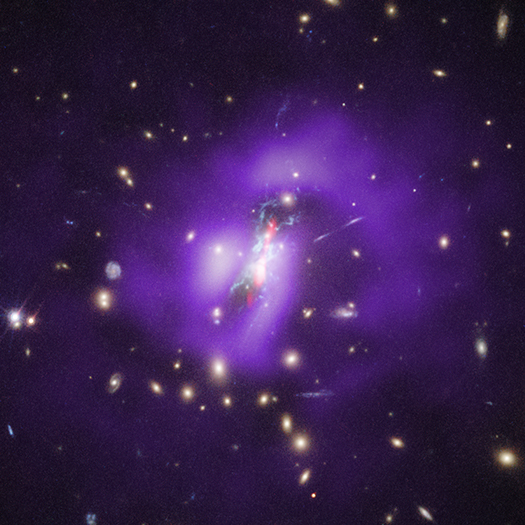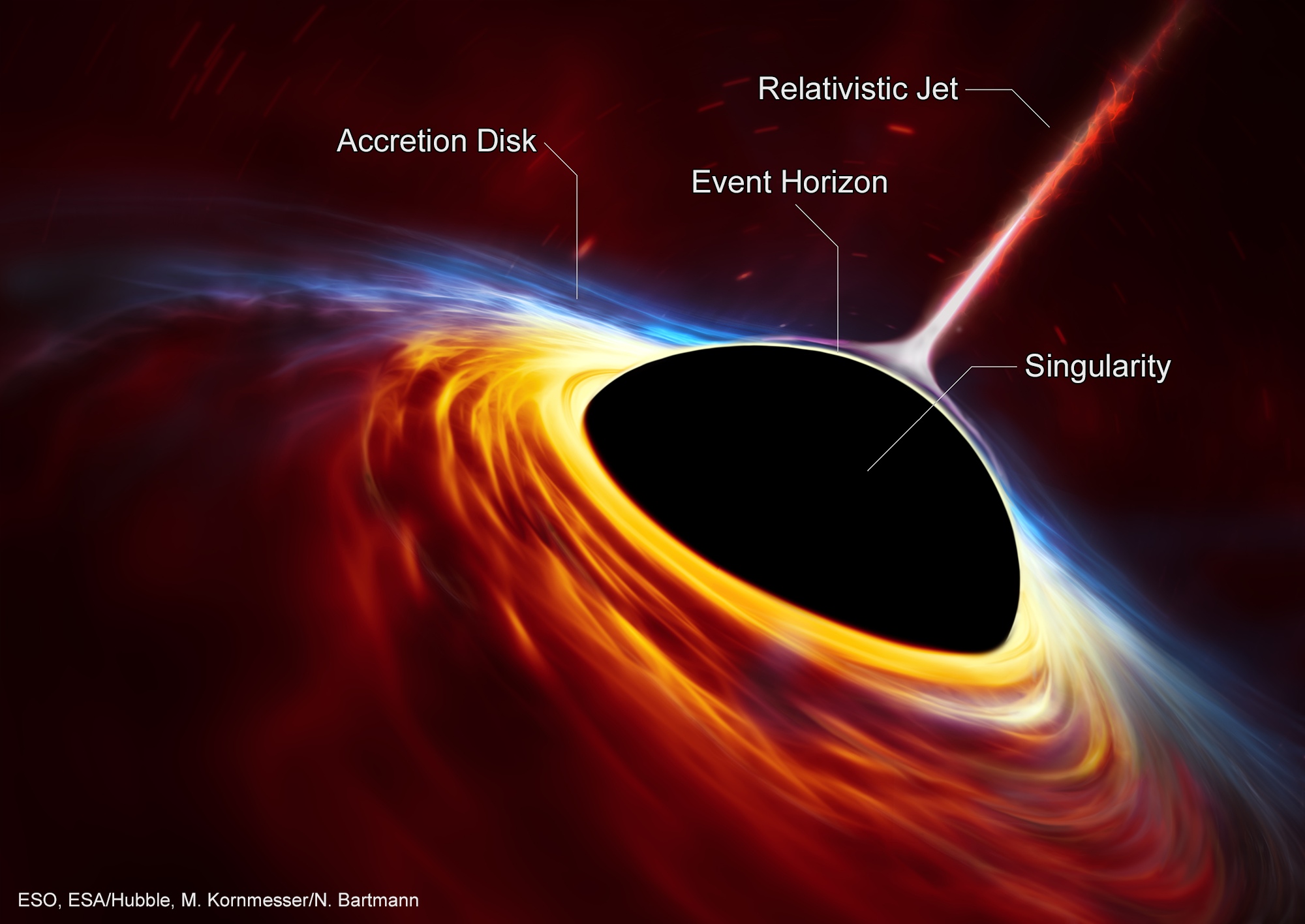Black Holes
Excavating a Dinosaur in a Galaxy Cluster
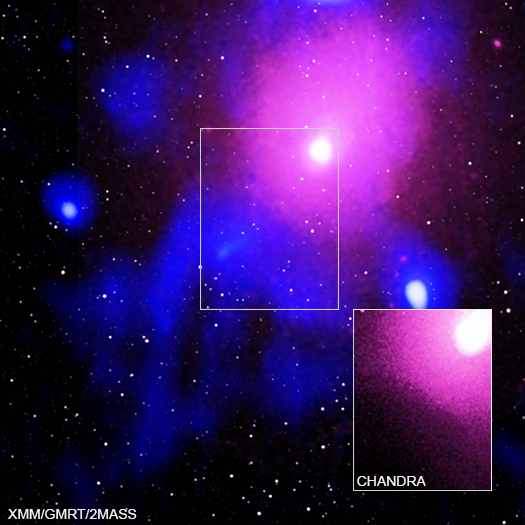
Ophiuchus Galaxy Cluster
Credit: X-ray: Chandra: NASA/CXC/NRL/S. Giacintucci, et al., XMM-Newton: ESA/XMM-Newton;
Radio: NCRA/TIFR/GMRT; Infrared: 2MASS/UMass/IPAC-Caltech/NASA/NSF
We are pleased to welcome two guest bloggers, Maxim Markevitch and Simona Giacintucci, who led the study described in our latest press release. Markevitch, an expert on galaxy clusters X-ray studies, got his PhD at the Space Research Institute of the Russian Academy of Sciences. He worked on ASCA X-ray data in Japan, then at the Chandra X-ray Center for the first 10 years of Chandra operations, and is now at the NASA Goddard Space Flight Center. He received the AAS Rossi Prize. Giacintucci, the lead author of the study, is an expert in radio phenomena in galaxy clusters. She got her PhD at Bologna University. She was a postdoc at the CfA and an Einstein fellow at the University of Maryland, and is now at the Naval Research Lab.
Galaxy clusters are colossal concentrations of dark matter, galaxies, and tenuous, 100-million-degree plasma. This plasma — gas where the electrons have been stripped from their atoms — slowly loses heat by emitting radiation in the form of X-rays. Around the central peaks of many clusters, where matter concentrates, the plasma gets dense enough* to cool quite fast, on a timescale shorter than the cluster's lifetime (a few billion years). The higher the plasma's density, the more X-rays it emits and the faster it cools. As it cools down, it contracts and becomes denser still, and so on, entering a runaway cooling process. Left unchecked, this process should deposit vast quantities of cold gas in the cluster centers.
We know for a fact that the plasma cools down because we do observe those X-rays — but we don't find nearly as much cold gas in the cluster centers as such runaway cooling must deposit. This has been a puzzle for a long while, and the solution the astronomers converged upon is that there must be some source of additional heat in the central regions of clusters — their “cores” — that doesn't let the plasma cool below 10 million degrees or so.
Early Chandra X-ray images of galaxy clusters pointed to the likely source: the supermassive black holes (SMBH) that sit in the centers of the cluster central galaxies, pull in the surrounding matter, and eject a tiny part of it (just before it sinks irretrievably into the black hole) at nearly the speed of light back into the surrounding gas. Where those jets hit the gas, they blow huge bubbles in it, stir it, generate shocks like sonic booms, etc. (all of these features have been seen in the Chandra images of the cluster cores). The current wisdom holds that these processes together supply the needed heat to prevent runaway cooling from occurring, but at the same time are not so powerful that they blow up the whole plasma cloud, implying some kind of a gentle, self-regulated feedback loop may be occurring.
Famous Black Hole Has Jet Pushing Cosmic Speed Limit
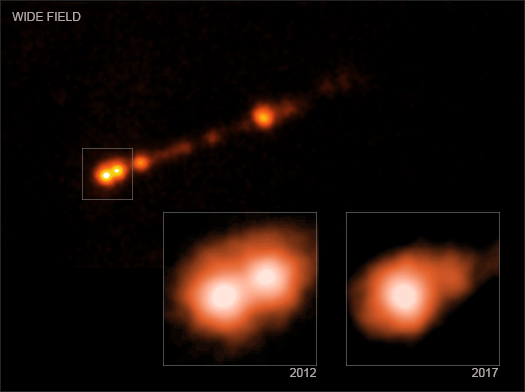
Supermassive Black Hole Jet in M87
Credit: NASA/CXC/SAO/B.Snios et al.
These images show evidence from NASA's Chandra X-ray Observatory that the black hole in the galaxy Messier 87 (M87) is blasting particles out at over 99% the speed of light, as described in our latest press release. While astronomers have observed features in the M87 jet blasting away from its black hole this quickly at radio and optical wavelengths for many years, this provides the strongest evidence yet that actual particles are travelling this fast. Astronomers required the sharp X-ray vision from Chandra in order to make these precise measurements.
The main panel of the graphic shows the entire length of M87's jet seen by Chandra, stretching for about 18,000 light years. "Knots" of X-ray emission seen here are created when material falls onto the M87 sporadically, creating bursts of X-ray light that travel along the jet and away from the black hole. The insets show Chandra observations taken in 2012 and 2017 of a small region near the base of the jet. The source in the lower left is X-ray emission from material around the black hole, and the other source is a knot in the jet about 900 light years from the black hole. This knot moves away from the black hole between 2012 and 2017 and also fades by 70%.
Galaxy Gathering Brings Warmth
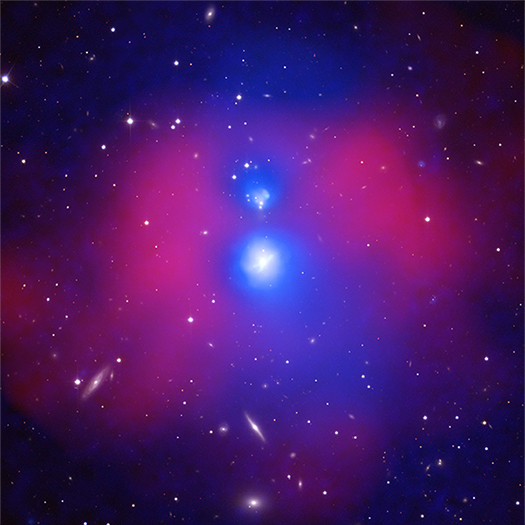
NGC 6338
Credit: X-ray: Chandra: NASA/CXC/SAO/E. O'Sullivan; XMM: ESA/XMM/E. O'Sullivan; Optical: SDSS
As the holiday season approaches, people in the northern hemisphere will gather indoors to stay warm. In keeping with the season, astronomers have studied two groups of galaxies that are rushing together and producing their own warmth.
The majority of galaxies do not exist in isolation. Rather, they are bound to other galaxies through gravity either in relatively small numbers known as "galaxy groups," or much larger concentrations called "galaxy clusters" consisting of hundreds or thousands of galaxies. Sometimes, these collections of galaxies are drawn toward one another by gravity and eventually merge.
Using NASA's Chandra X-ray Observatory, ESA's XMM-Newton, the Giant Metrewave Radio Telescope (GMRT), and optical observations with the Apache Point Observatory in New Mexico, a team of astronomers has found that two galaxy groups are smashing into each other at a remarkable speed of about 4 million miles per hour. This could be the most violent collision yet seen between two galaxy groups.
A Friendly Neighborhood Supermassive Black Hole

Roberto Gilli
We are very happy to welcome Roberto Gilli as our guest blogger. Dr. Gilli is the first author of a paper that is the subject of our latest Chandra press release. He received his Ph.D. in astronomy from Firenze University in Italy in 2001. Afterward, he did a post-doctoral fellowship at The Johns Hopkins Observatory before returning to Firenze at the Arcetri Astrophysical Observatory. Today, he is an astronomer at the National Institute of Astrophysics (INAF) in Bologna, Italy, a position he has held since 2005. His research interests include active galactic nuclei, quasars, and deep X-ray surveys.
Black holes are usually perceived as dangerous, disruptive systems. On the one hand they swallow copious amount of matter. On the other, they release a large amount of energy in the form of both radiation and matter when enormous quantities of material fall onto them.
The most extreme manifestation of such phenomenon is known as a "quasar" or an "active galactic nucleus" (AGN) that are powered by growing supermassive black holes (SMBHs) at galaxy centers. During these growth phases, part of the gravitational energy of the infalling gas is converted into strong electromagnetic radiation. Meanwhile, some of the gas, rather than being swallowed by the black hole, is instead accelerated and pushed very far away in the form of fast winds or even faster jets that can approach the speed of light.
A Weakened Black Hole Allows Its Galaxy to Awaken
The Phoenix galaxy cluster contains the first confirmed supermassive black hole that is unable to prevent large numbers of stars from forming in the core of the galaxy cluster where it resides. This result, reported in our latest press release, was made by combining data from NASA's Chandra X-ray Observatory and Hubble Space Telescope, and the NSF's Karl Jansky Very Large Array (VLA). A new composite image shows data from each telescope. X-rays from Chandra depict hot gas in purple and radio emission from the VLA features jets in red. Optical light data from Hubble show galaxies (in yellow), and filaments of cooler gas where stars are forming (in light blue).
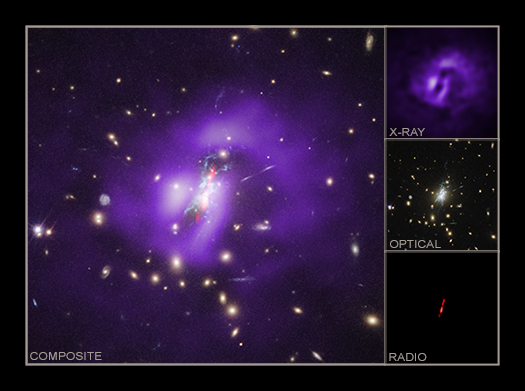
Hunting Elusive Giants: Chandra Spots a Triple AGN
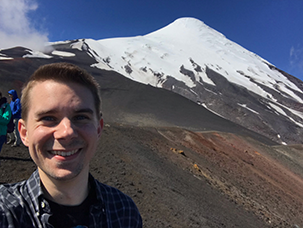
Ryan W. Pfeifle
We welcome Ryan W. Pfeifle as our guest blogger. He received his B.S. in Physics from George Mason University (GMU) in 2017, and then stayed at GMU to continue onto his Ph.D and work with his current advisor on colliding galaxies and active galactic nuclei (AGNs). He is currently a third-year graduate research assistant in the Department of Physics and Astronomy at GMU. His primary focus is the identification and characterization of dual and triple AGNs in advanced mergers in an effort to understand the relationship between galaxy mergers and black hole growth. He has two recently published papers, one on their dual AGN program (published in April and available here), and one that is the focus of this press release, published in the Astrophysical Journal and available here. In addition to his research work, he is a tour guide at the GMU observatory in Fairfax, VA.
Over the past several decades, we have come to understand that supermassive black holes (SMBHs), with masses in the range of one million to several billion times the mass of our own sun, reside at the centers of most massive galaxies. Not only do we see these SMBHs in nearby galaxies, we also see them in galaxies as early as a few hundred million years after the Big Bang! Astronomers are still struggling to explain how these massive black holes could grow to these immense sizes so quickly, but one possible explanation lies in the interactions between galaxies.
Found: Three Black Holes On Collision Course
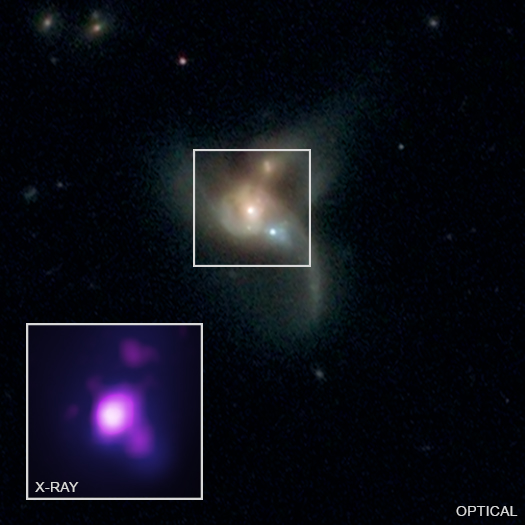
SDSS J084905.51+111447.2
Credit: X-ray: NASA/CXC/George Mason Univ./R. Pfeifle et al.; Optical: SDSS & NASA/STScI
A new study using data from NASA's Chandra X-ray Observatory and other telescopes provides the strongest evidence yet for a system of three supermassive black holes, as described in our latest press release. Astronomers think these triplet collisions, while extremely rare, play a critical role in how the biggest black holes grow over time.
The system is known as SDSS J084905.51+111447.2 (SDSS J0849+1114 for short) and is located a billion light years from Earth. In this graphic, X-rays from Chandra (purple) are shown in the pull-out in comparison with optical light from the Hubble Space Telescope and the Sloan Digital Sky Survey (red, green, and blue) in the main panel.
Let’s Talk About Black Holes
Recently, we put out a press release about the regular dining habits of a supermassive black hole. Not only was this black hole found to be consuming material, or "eating," it was doing so regularly, about once every nine hours. While scientists had found such regular eating habits of smaller, so-called stellar mass black holes, this is the first evidence of such behavior in the black hole giants that live at the centers of galaxies.
The lead author of the result, which used data from both NASA's Chandra X-ray Observatory and ESA's XMM-Newton, is Giovanni Minuitti of the Center for Astrobiology (CAB, CSIC-INTA) in Spain. Recently, he agreed to answer a series of questions about his work aimed at kids.
How would you explain a supermassive black hole to kids?
Let me start from the beginning.
Any object with mass (a planet, a star, a black hole, and even our own bodies) produces a force — gravity — attracting towards it any other body with mass. Gravity is a force that is proportional to the mass of the object that produces it, and that is stronger if you are closer. Basically, the higher the mass of the body and the closer to the body you are, the stronger the pull you feel.
Scientists Discover Black Hole Has Three Hot Meals a Day
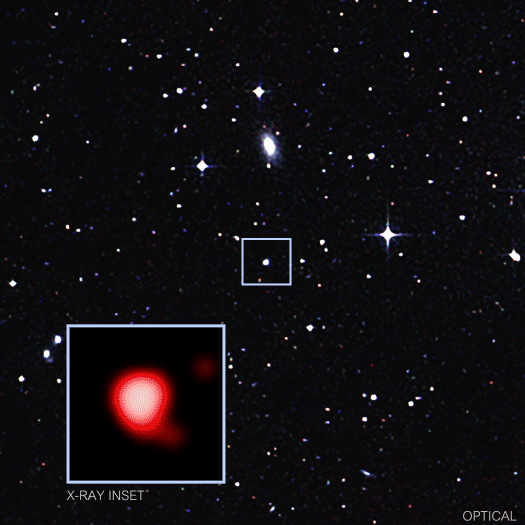
GSN 069
Credit: X-ray: NASA/CXO/CSIC-INTA/G.Miniutti et al.; Optical: DSS
A supermassive black hole is blasting out X-rays about every nine hours, according to data from NASA's Chandra X-ray Observatory and ESA's XMM-Newton, as described in our latest press release. This indicates that this black hole, containing about 400,000 times the mass of our Sun, is consuming significant amounts of material about three times per day.
The main panel of this graphic is a visible light image taken by the Digitized Sky Survey (DSS) around the galaxy known as GSN 069, located in the center of the image. The inset gives a time-lapse of Chandra data taken over a period of about 20 hours on February 14 and 15, 2019, centered on the X-ray source in the middle of GSN 069. The sequence runs in a loop to show that the X-ray brightness of the source changes regularly and dramatically over the Chandra observation. Three X-ray eruptions are observed. (Note that to clearly show the Chandra source is located in GSN 069, the size of the box in the center of the DSS image is about ten times larger than the Chandra field in the inset.)
Did We Finally Detect the First Heavily Obscured Quasar in the Kindergarten of the Universe?

Fabio Vito
We are very pleased to welcome Fabio Vito as our guest blogger. Vito is the first author of a paper that is the subject of our latest press release, on the discovery of a distant, cloaked black hole. He obtained his PhD in 2014 at the University of Bologna, Italy, before moving to Penn State as a postdoctoral researcher. He is now a postdoctoral fellow at the Pontificia Universidad Católica de Chile. He mainly works on the properties and evolution of high-redshift AGN, with the final goal of understanding how they formed and grew in the first billion years of the Universe.
Imagine you are a teacher in a kindergarten starting the school year. You enter the classroom, but instead of finding little children, you see fully grown people — men and women — staring at you. Puzzled, you check with the principal, and they confirm that those people are supposed to be the new kindergarteners, just a handful of years old. Two things come to your mind immediately: 1) this is definitely going to be a very long school year, 2) what happened? Why are adults sitting in your kindergarten classroom?
Astrophysicists find themselves in a similar situation today. According to our theoretical knowledge, supermassive black holes (SMBHs) should grow from "seeds" with masses not larger than hundreds of thousands of solar masses. We then use the most powerful telescopes to find the most distant — both in space and in time — growing SMBHs, shining as “quasars,” about 13 billion years ago, when the Universe was just a few hundred million years old. We look for them because astronomers want to study how they grew to become the monsters that populate the older Universe, with masses of billions of solar masses. However, the SMBHs powering the quasars that we find in the kindergarten of the Universe are already fully grown! They are indeed already as massive as the most massive SMBHs in the local Universe.

